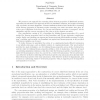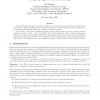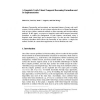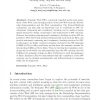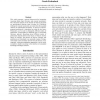121
Voted
COSIT
1999
Springer
15 years 6 months ago
1999
Springer
Abstract. This paper describes some recent cognitively-based and computationally-based research on representing and reasoning about shapes. The cognitive studies are based on proto...
126
Voted
PODC
1999
ACM
15 years 7 months ago
1999
ACM
We present a new approach for reasoning about liveness properties of distributed systems, represented as automata. Our approach is based on simulation relations, and requires reas...
111
click to vote
AMAI
2000
Springer
15 years 7 months ago
2000
Springer
Several formalisms have been proposed for qualitative reasoning about regions and their topological relations in space. These formalisms, based on pairwise relations, do not allow...
131
Voted
SGAI
2009
Springer
15 years 7 months ago
2009
Springer
Temporality and uncertainty are important features of many real world systems. Solving problems in such systems requires the use of formal mechanism such as logic systems, statisti...
111
Voted
AINA
2010
IEEE
15 years 7 months ago
2010
IEEE
—In order for Semantic Web applications to be successful a key component should be their ability to take advantage of rich content descriptions in meaningful ways. Reasoning cons...
124
Voted
FM
2003
Springer
15 years 7 months ago
2003
Springer
Abstract. Semantic Web (SW), commonly regarded as the next generation of the Web, is an emerging vision of the new Web from the Knowledge Representation and the Web communities. Th...
124
Voted
CONCUR
2003
Springer
15 years 7 months ago
2003
Springer
Patterns of Compositional Reasoning Nina Amla1 , E. Allen Emerson2 , Kedar Namjoshi3 , and Richard Trefler4 1 Cadence Design Systems 2 Univ. of Texas at Austin 3 Bell Labs, Lucent...
117
Voted
OTM
2004
Springer
15 years 8 months ago
2004
Springer
Case-based reasoning in the law is a reasoning strategy in which legal conclusions are supported by decisions made by judges. If the case at hand is analogous to a settled case, th...
119
click to vote
KR
2004
Springer
15 years 8 months ago
2004
Springer
This article presents a general framework for integrating reasoning about object structure and concept taxonomies. The structural relations in the domain of objects discussed are ...
101
Voted
SEMWEB
2005
Springer
15 years 8 months ago
2005
Springer
Abstract. Decentralized case-based reasoning (DzCBR) is a reasoning framework that addresses the problem of adaptive reasoning in a multi-ontology environment. It is a case-based r...

